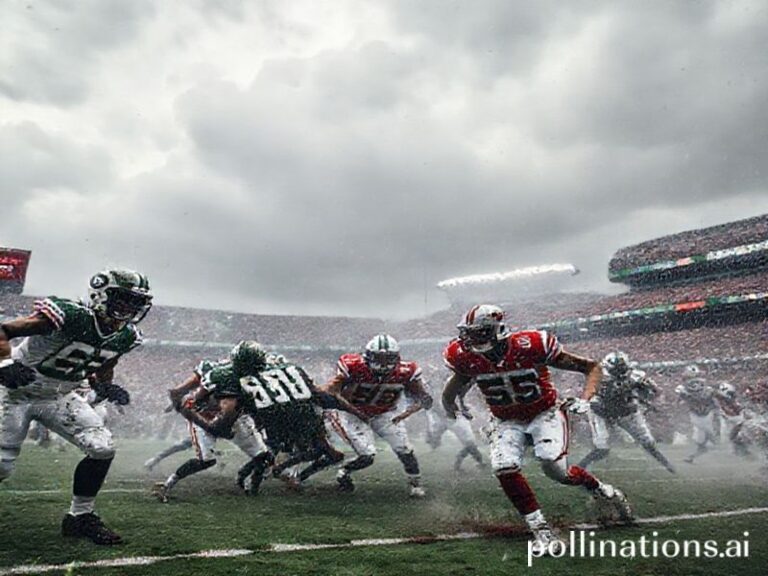Carlos Narváez Vanishes: How One Colombian Journalist Became a Global Inventory Item in the Supply Chain of Silence
Carlos Narváez, the Colombian investigative journalist who vanished last Tuesday while tracking a weapons-smuggling ring in the Catatumbo region, has become the latest entry in humanity’s longest-running reality show: “Guess Which Continent Murdered the Messenger This Week.” From the glass towers of Brussels to the ramen-scented newsrooms of Tokyo, his disappearance is being processed as both tragedy and spreadsheet entry—another cell in the ever-expanding Excel file titled “Reporters Who Inconvenienced Someone With Deep Pockets.”
International reaction followed the standard choreography. UNESCO issued a statement so bland it could be served as airline food. The Committee to Protect Journalists updated its “risk map,” a cartographic exercise that increasingly resembles a global Pollock painting—splashes of red wherever someone asked why the local strongman’s offshore account resembles a phone number. Meanwhile, the European Parliament debated a resolution that will, if passed, strongly encourage Colombia to maybe consider not misplacing its citizens, provided no one’s trade deal is inconvenienced.
Yet beneath the ritualized hand-wringing, Narváez’s case carries a whiff of geopolitical déjà vu. The rifles he was chasing—Bulgarian AK derivatives that apparently took a scenic tour through Istanbul, Miami, and a shell company whose mailing address is a Starbucks in Panama—are the same model currently seasoning conflicts from Sudan to downtown Marseille. One gun, many passports: the truest symbol of our borderless age. If globalization had a family crest, it would be a Kalashnikov crossed with a shipping container under the motto “We Deliver Anywhere, No Questions Asked.”
Colombian authorities, ever the optimists, suggest Narváez may have “slipped during a river crossing,” a hypothesis that requires believing a seasoned reporter spontaneously decided to impersonate a damp tortilla. The country’s defense minister simultaneously promised “a thorough investigation” and reminded everyone that Colombia’s homicide rate is “trending downward”—a statistical comfort roughly equivalent to being told the Titanic’s deck chairs were rearranged with maritime efficiency.
Still, the international press corps clings to procedure. Correspondents filed their stories, tweeted their outrage, and retired to hotel bars where the house wine tastes of accreditation badges and existential dread. In Hong Kong, a veteran cameraman watched the cable ticker and muttered, “At least Narváez got a headline. In my city we disappear in paragraphs.” Dark humor, yes, but the kind that keeps the motor running when the fuel tank is labeled “What’s the bloody point?”
The broader significance—beyond another mother receiving a folded flag she never asked for—is that Narváez’s vanishing act illuminates the supply chain of silence. Bullets travel farther than journalists; impunity travels farthest of all. Every continent has its own flavor: in Mexico they call it “periodista desaparecido,” in Malta they call it “car bomb,” in Russia “sudden window allergy.” The vocabulary changes, the inventory list does not.
Investors, of course, remain bullish. Shares in private-security firms ticked up three points on the NASDAQ, because nothing says “market confidence” like the certainty that someone, somewhere, will need armed babysitting. Over in Davos, a drone-startup pitch deck already features Narváez’s face under the slide “Growing Demand for Conflict-Zone Surveillance.” Even martyrdom gets monetized; the IPO roadshow starts Tuesday.
And so the planet spins, one reporter lighter, one spreadsheet heavier. Somewhere a news editor shrugs: “If it bleeds, it leads—if it disappears, it goes in the follow-up.” The Catatumbo jungle keeps its secrets, the rifles catch a connecting flight, and the rest of us refresh our feeds, half-hoping for closure, half-hoping the Wi-Fi holds out long enough to ignore the knock on our own door.
Carlos Narváez is gone, but the assembly line of forgetting hums along, staffed by bureaucrats who file press freedom reports next to export licenses. The world will remember him for approximately one news cycle—roughly the half-life of a Tweet and the attention span of a goldfish on Adderall. After that, we return to our regularly scheduled programming: outrage at rising avocado prices, breathless speculation about which celebrity wore which dress, and the comforting illusion that distance equals safety.
Until the next journalist boards the next bus into the next green inferno, armed with nothing but a notebook and the quaint belief that someone, somewhere, still gives a damn. Safe travels, Mr. Narváez. The planet’s short-term memory is already clearing space.







